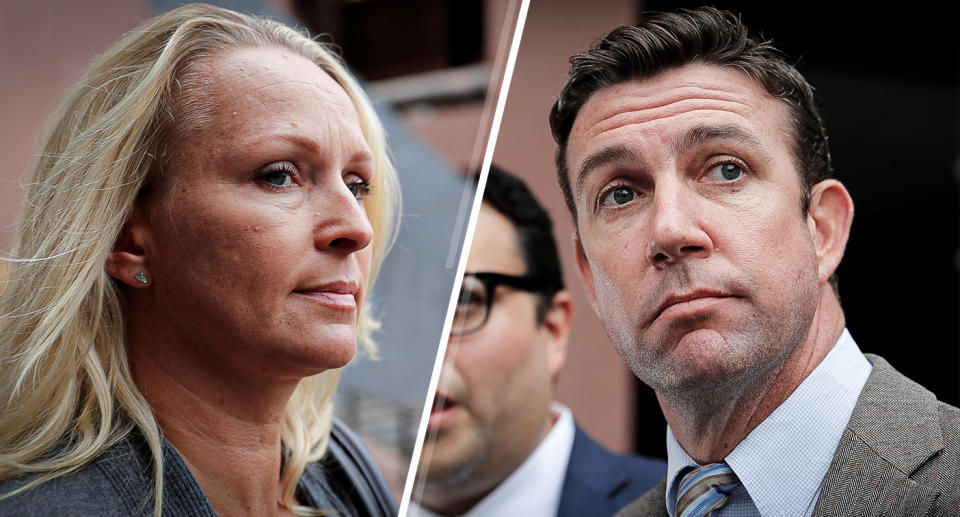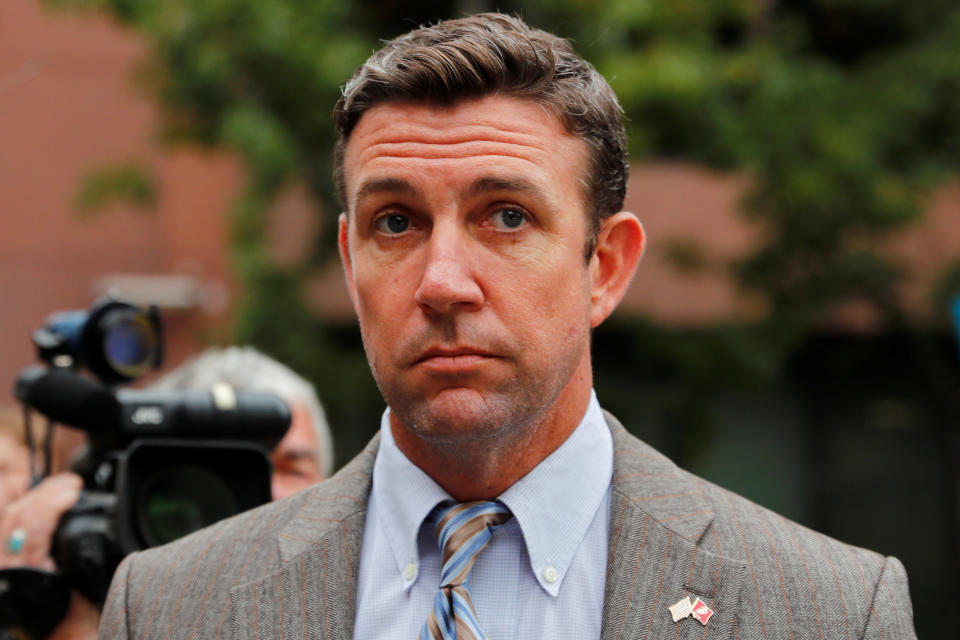California Rep. Hunter's wife may have flipped on him in corruption case
When Rep. Duncan Hunter, R-Calif., was indicted in August 2018 on 60 criminal counts alleging that he spent more than $250,000 in campaign donations on luxury trips, tequila shots, Costco shopping sprees and other personal items, his first reaction was to blame his wife.
“She handled my finances,” Hunter, 42, told Fox News last year. “She was also the campaign manager, so whatever she did, that’ll be looked at too.”
“But I didn’t do it,” he added. “I didn’t spend any money illegally.”
Now Margaret Hunter may be getting her revenge — and as a result she could help a Democrat replace her husband in Congress.
Initially Margaret Hunter, 44, followed her husband’s lead and pleaded not guilty to all charges. (She was indicted last summer alongside him.) But on Thursday morning she shocked the political world by appearing at a federal court in San Diego and reversing course, pleading guilty to one charge of conspiracy to use campaign funds for a 2015 family vacation to Italy and attesting to $200,000 in fraudulent spending, involving at least 30 illegal transactions.

“Earlier this morning I entered a guilty plea before the United States District Court,” Hunter said in a statement read by her attorney Thomas McNamara on the courthouse steps. “In doing so I have fully accepted responsibility for my conduct. I am deeply remorseful and I apologize. I am saddened for the hurt I have caused my family and others. I understand that there will be more consequences stemming from my actions, but as demonstrated this morning with the entry of the plea, I have taken the first step to face those consequences.”
According to her 22-page plea agreement, Hunter has promised to testify before any trial or post-trial proceedings “as deemed necessary by the government” and to tell federal and state law enforcement agents and attorneys everything she knows about the case. Provided she continues to cooperate, she will face a reduced set of charges and a recommendation of leniency in sentencing.
Asked by a reporter whether Hunter had also agreed to testify against her husband, McNamara declined to answer.
If Margaret Hunter has “flipped” on her spouse, she will likely serve as the prosecutors’ star witness when the case goes to trial in September — aiding them in securing a conviction that could, in turn, boost Democrats’ chances of flipping Hunter’s Republican-leaning San Diego-area seat.

The question isn’t so much the scope of the alleged crimes. Last summer’s indictment, which followed two-plus years of reporting by the San Diego Union-Tribune, set forth in extensive detail some 200 occasions when the Hunters allegedly misused campaign money: $1,300 of video game expenses; more than $140,000 at bars and restaurants, including $5,000 for fast food; two separate flights to Warsaw, Poland, for Margaret Hunter’s mother; a garage door; a trip to Italy; oral surgery; makeup from Bloomingdale’s; tickets to SeaWorld; private school tuition and lunches; and, most colorfully, a $600 cross-country plane ticket for the family’s pet rabbit.
In one memorable incident, the indictment alleged that when Rep. Hunter wanted to buy a pair of “Hawaii shorts” for golf but didn’t have the money on hand, Margaret Hunter advised him to go to a golf pro shop and charge the campaign so they could falsely describe the purchase as “some [golf] balls for the wounded warriors.”
In the plea deal Margaret Hunter signed Tuesday, she directly implicated her husband in many of these fraudulent transactions.
According to the indictment, their spending was part of a pattern of financial mismanagement. Over seven years, the Hunters allegedly overdrew their personal bank account more than 1,100 times, racking up $37,761 in “overdraft” and “insufficient funds” fees. Records show the Hunters often tapped campaign funds when their personal account was low or overdrawn.
Yet all of this information was widely publicized before last November’s midterm election, and Hunter still managed to defeat his Democratic challenger, former Obama administration official Ammar Campa-Najjar — albeit by a slim, 3-point margin. Hunter won each of previous elections in California’s conservative, military-heavy 50th Congressional District by 27 to 42 percentage points; his father, also named Duncan Hunter, previously represented the area in Congress for nearly 30 years.
The question going forward is not, then, whether CA-50 voters sour on Hunter’s conduct by November 2020. The question is whether Hunter can even make it that far.

If Hunter is convicted — the charges against him could carry a prison sentence of up to five years — no constitutional provision or House rule would require him to be removed from Congress; if imprisoned, he would no longer be allowed to vote on behalf of his district, but he would technically be allowed to retain his seat. Even so, he would almost certainly come under enormous pressure from Republican leaders to resign.
Hunter has resisted such entreaties before. After the indictment, Hunter refused to step down or remove himself from the ballot, blaming the charges on a “deep state” Democratic “witch hunt” against him, and when then-House Speaker Paul Ryan, R-Wis., threatened to strip Hunter of his committee assignments, he initially broke with standard practice and refused to relinquish them. (Eventually, Hunter relented, and he has been largely powerless since.)
Yet a conviction would nearly impossible for Hunter to brush off. If he does attempt to remain in Congress, the Democratic leadership would have a choice. Either they could vote to expel him — a rare maneuver that’s been used only five times in U.S. history, mostly recently in 2002 — or they could let him stay.
The latter would be the more Machiavellian option. The Palestinian-Mexican-American Campa-Najjar is running again in 2020, and it’s hard to imagine a weaker Republican opponent than an imprisoned felon. As Campa-Najjar said in a statement Thursday, “We simply can no longer afford the costs of Hunter’s corruption in CA50. … We deserve more than a congressman who is quite literally useless in Congress using taxpayer dollars to pay his legal fees.”
The far more likely scenario, however, is that a convicted Hunter either succumbs to GOP pressure or is forcibly expelled from Congress. Both outcomes would trigger a special House election. In California, such elections are typically called within 14 days of removal or resignation, and held 126 to 140 days later.
,With the trial expected to last until early-to-mid October, that would push the special election to March or April 2020.

Two Republicans, retired Navy SEAL Larry Wilske and Temecula, Calif., Councilman Matt Rahn, have announced primary challenges to Hunter, and they would likely face off against Ammar-Najjar (and perhaps others) in a nonpartisan, top-two primary before proceeding to a special-election runoff.
Either way, Ammar-Najjar would likely benefit from national Democratic money and attention as the party seeks to add another former GOP seat to the seven it flipped in California in 2018.
It was unclear Thursday what prompted Margaret Hunter to suddenly reverse her plea and further imperil her husband’s political future. But the answer may lie in the indictment. According to prosecutors, five unnamed people benefited from the congressman’s illegal spending: individuals 14 through 18. All of them “lived in the Washington D.C. area” and had “personal relationships with Duncan Hunter,” the indictment states. Among the spending tied to these “individuals” were weekend stays at a Lake Tahoe resort and an Uber fare from one of their homes to Hunter’s congressional office at 7:40 a.m. on a Thursday.
In a letter last August to the Justice Department, Hunter defense attorney Gregory Vega objected to the inclusion of such details in the indictment, which he said prosecutors had included to imply the “spending of campaign funds for extramarital infidelities.”
Previously, when confronted by Politico with questions about “alleged romantic relationships with two women about whom the FBI has inquired,” Hunter dismissed the issue as “tabloid trash.”
Either way, the Hunters appear to have grown apart. As the San Diego Union- Tribune reported Wednesday, “the couple appeared jointly at initial court appearances immediately following the August indictment” — but “arrived separately to more recent proceedings.” The paper noted that the couple “sat in separate parts of the courtroom and avoided speaking or [making] eye contact.”
_____
Read more from Yahoo News:



